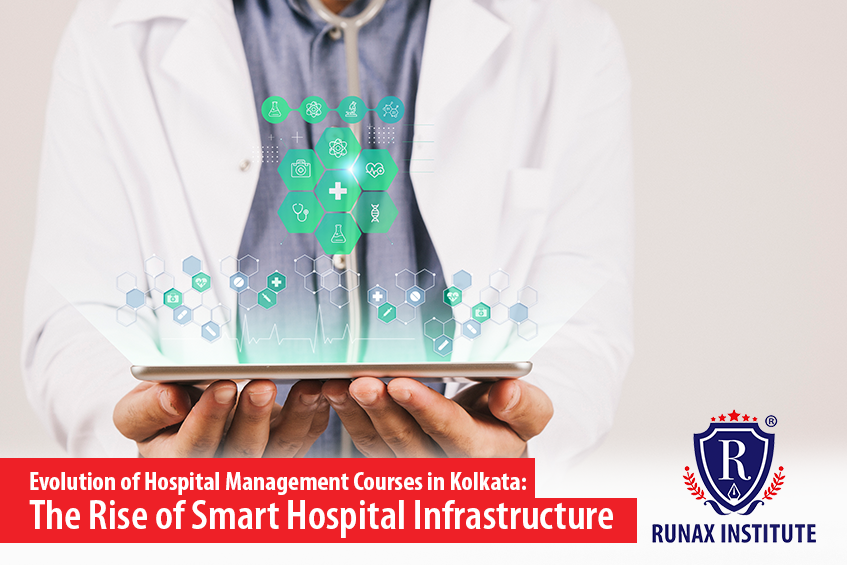Introduction
Hospitals today don’t run only on doctors, nurses, and medicines. They run on data, automation, smart infrastructure, and let’s be honest—a lot of tech that most of us wouldn’t have imagined ten years ago. Picture this: a hospital ward in Kolkata where IoT-based patient monitoring tracks vitals in real-time, an AI analytics dashboard in hospital management predicts bed occupancy, and digital patient flow systems ensure patients don’t spend their entire day stuck in queues. Sounds futuristic? Not anymore. It’s already happening.
Here’s the problem, though. Traditional hospital administrators weren’t trained to handle this kind of setup. They were experts in patient records, scheduling, and manual operations—but not in hospital management technology like EHR training in hospital courses, Hospital Information Systems (HIS) implementation through hospital courses, or healthcare automation education. Hospitals were unable to meet the demands of modern infrastructure because of this talent deficit.
That’s exactly why hospital management courses in Kolkata are going through a transformation. They’re shifting from paper-driven lessons to a smart hospital curriculum that covers IoT in hospital administration courses, AI-driven analytics, energy-efficient hospital infrastructure training, and even live hospital systems in coursework. Students are no longer just learning how to manage—they’re learning how to architect hospitals that are connected, sustainable, and future-proof.
In this blog, you’ll see how Kolkata’s programs are rewriting the syllabus to prepare graduates for the digital, automated, and sustainable hospitals of tomorrow.
Historical Roots: From Paper Records to Digital Beginnings
Let’s rewind a bit. A few decades ago, a typical hospital administrator in Kolkata spent most of the day juggling registers, paper files, and hand-written patient histories. Admission meant forms, billing meant piles of receipts, and managing inventory often meant one poor soul counting bandages at the end of every shift.
These processes were naturally reflected in hospital management courses offered in Kolkata at the time. Students were trained in basic record-keeping, scheduling, and staff coordination. The focus was operational efficiency—but in a manual world.
Slowly, though, the winds of hospital management digitisation began to blow. Institutions under West Bengal University of Health Sciences (WBUHS) started experimenting with rudimentary Hospital Information Systems (HIS) and early Management Information Systems (MIS) projects. Course modules introduced students to digitised record-keeping, paving the way for today’s more advanced EHR training in hospital courses.
These early experiments might look basic now, but they laid the foundation. Without that shift from pure manual records to even partial automation, the move toward smart infrastructure would have been impossible.
Modern Pressures: Overcrowded Hospitals Demand Smarter Systems
Now fast-forward to the present. Kolkata’s hospitals are busier than ever. Patient inflows are skyrocketing, OPDs are bursting at the seams, and administrators are constantly firefighting capacity crunches. Add in resource shortages and rising expectations, and suddenly running a hospital isn’t just about management—it’s about survival.
This relentless pressure pushed colleges to adapt. Today’s hospital management course in Kolkata includes modules on digital patient flow systems and hospital management technology that tackle overcrowding head-on. Students learn how to design automated admission workflows, implement queue management systems, and use dashboards to allocate beds more efficiently.
Instead of standing in lines, patients now move through digitised admission systems and are tracked using live hospital systems in coursework-inspired solutions. That means less chaos, smoother operations, and administrators who actually breathe during peak hours.
In short, modern challenges forced curricula to evolve, and now graduates are trained to face real-world pressure with smart, tech-driven solutions.
Smart Hospitals Defined: What Indian Healthcare Means by It
“Smart hospital” isn’t some fancy marketing phrase. In the Indian context, it means hospitals that integrate IoT devices, AI analytics, modular IT systems, and connected workflows to deliver better care and greater efficiency.
For instance, IoT in hospital administration courses now explain how wearable sensors can track a patient’s oxygen levels, while AI analytics in hospital management predicts which wards are likely to fill up based on seasonal data. It also includes simple, patient-facing tech like apps for pre-admission registration or AI chatbots that answer queries 24/7.
Then there’s the heart of smart systems—Electronic Health Records (EHR). Students in Kolkata are trained in EHR training in hospital courses to ensure data flows seamlessly across departments.
So in India, a smart hospital infrastructure means a mix of connected ICUs, integrated dashboards, and hospital management digitisation that’s scalable, practical, and patient-centric—not some sci-fi fantasy with robots doing surgeries.
Curriculum Transformation: Hands-On Smart Infrastructure Tutorials
Here’s where it gets interesting. The biggest transformation isn’t in hospitals—it’s in classrooms. Kolkata’s hospital management colleges are reinventing how they teach.
Students no longer just study theories; they actively work with EHR simulators, practice IoT-based patient monitoring in labs, and even design prototypes of automated patient flow systems. Capstone projects often involve building mini healthcare automation education solutions, showing how concepts actually work in practice.
And it doesn’t stop in classrooms. Colleges and hospitals work together to give students the opportunity to watch smart infrastructure in action, monitor digital patient flow systems, and shadow administrators. By graduation, students have practical experience managing connected workflows, energy systems, and automated inventory processes.
This kind of hands-on training ensures students aren’t just talking about smart hospitals—they’ve already managed them, at least in training environments.
Tech Stack Deep Dive: IoT, AI & Data Analytics in Study Modules
These days, a hospital management course in Kolkata focuses on learning a genuine tech stack rather than just strategy.
Students learn how IoT-based patient monitoring tools like smart wristbands track vitals in real time. They’re introduced to AI analytics in hospital management that predicts peak patient hours, enabling better staff scheduling. Courses include data dashboards that combine patient admissions, pharmacy stocks, and diagnostic timelines—all in one place.
There’s also a focus on ambulance-to-ward tracking systems, which help hospitals prep for incoming patients before they even arrive. Then comes EHR analytics, where students study patterns in medical records to improve both efficiency and patient outcomes.
All of this ensures graduates move beyond spreadsheets into live data-driven hospital oversight—a skill in huge demand in Kolkata’s evolving healthcare scene.
Collaboration with Smart Hospital Institutions in Kolkata
Theory is nothing without practice, and that’s why partnerships with real hospitals are key. Some of the best hospital management colleges in Kolkata have tie-ups with institutions like Tata Medical Centre, where students get firsthand exposure to smart hospital partnerships.
In these settings, students observe how digital imaging systems, automated oncology workflows, or integrated EHR dashboards operate in real time. They don’t just read about hospital management technology—they see how doctors, nurses, and administrators use it daily.
This practical exposure helps bridge the gap between what’s taught in classrooms and what actually runs inside a hospital. It also builds confidence, ensuring graduates are job-ready from day one.
Regulatory Push: Accreditation & Tech Readiness
Hospitals in India don’t just adopt tech because it’s cool—they do it because regulators demand it. Accreditation bodies like NABH (National Accreditation Board for Hospitals & Healthcare Providers) now require hospitals to demonstrate digital readiness.
That means showcasing HIS implementation through hospital courses, proving compliance dashboards work, and ensuring integrated patient safety systems are in place.
To keep up, hospital management courses in Kolkata now include accreditation-prep modules. Students learn how to manage audits, prepare compliance reports, and guide hospitals through tech-based accreditation requirements. By the time they graduate, they’re not just administrators—they’re compliance leaders ready for smart hospital audits.
Roadblocks & Challenges: Infrastructure and Skill Gaps
Of course, it’s not all smooth sailing. Smart hospitals sound amazing, but the reality is that many face infrastructure costs, IT skill gaps, and bandwidth limitations.
Modern systems are not affordable for all of Kolkata’s hospitals. Stable networking, proper IT maintenance, and skilled technicians are often missing. That’s why courses now train students on ROI-sensitive, modular smart hospital solutions. Instead of suggesting million-dollar upgrades, they learn to implement cost-effective hospital management digitisation strategies that scale over time.
Skill gaps are another challenge. Tech-heavy hospitals need administrators who understand both healthcare workflows and IT systems. That’s why healthcare automation education is now core to the curriculum. Students aren’t just admins—they’re hybrid professionals bridging medicine and tech.
Sustainable Tech: Green Smart Hospitals & Resource Management
Another big shift is sustainability. Hospitals in Kolkata face power shortages, rising costs, and environmental challenges. That’s why sustainable hospital management is now a major part of the conversation.
Students are introduced to energy-efficient hospital infrastructure training where they study smart HVAC systems, solar integration, and eco-friendly IT setups. Courses teach how to design hospitals that save energy while improving patient comfort.
Graduates learn that being “smart” isn’t just about gadgets—it’s about sustainability + efficiency. The goal is to create green smart hospitals that protect both patients and the planet.
Future-Ready Graduates: Managing Tomorrow’s Hospital Ecosystems
Here’s the exciting part: tomorrow’s graduates won’t just be managers—they’ll be techno-strategists.
They’ll oversee voice-enabled nurse alerts, predictive maintenance schedules for hospital equipment, and AI-driven workflows that cut waiting times. They’ll ensure EHR systems integrate with CRM tools so hospitals don’t just treat patients—they engage them seamlessly.
Graduates from hospital management courses in Kolkata will shape hospitals into resilient ecosystems, balancing AI-powered automation with humane, patient-centric care. In short, they’ll be the architects of hospitals that are smarter, greener, and more efficient than ever before.
Conclusion
A fascinating narrative can be found in the evolution of hospital management courses in Kolkata. From paper registers and manual processes to IoT-enabled patient monitoring, AI analytics dashboards, and energy-efficient smart hospitals, the journey reflects how healthcare has transformed in just a few decades.
Today’s students are learning far more than administrative basics. They’re being trained in smart hospital curriculum modules, from HIS implementation through hospital courses to healthcare automation education and sustainable hospital management practices. They’re collaborating with institutions like Tata Medical Centre, witnessing smart hospital partnerships in action, and preparing for global accreditation standards.
Of course, challenges remain—costs, skill gaps, infrastructure—but the curriculum is designed to address them with practical, scalable solutions.
For anyone considering a hospital management course in Kolkata, the message is clear: this isn’t about managing yesterday’s hospitals. It’s about building tomorrow’s smart, sustainable, and tech-driven healthcare ecosystems.
Frequently Asked Questions
1. What makes hospital management courses in Kolkata different today?
They now include training in smart infrastructure, IoT devices, AI analytics, and EHR systems—not just traditional admin tasks.
2. Do these courses offer hands-on training in smart hospital systems?
Yes. Students practice with EHR simulators, IoT monitoring prototypes, and live hospital systems in coursework.
3. How do smart hospital curricula prepare graduates for sustainability?
They include energy-efficient hospital infrastructure training and eco-friendly hospital design modules.
4. Which institutions in Kolkata are known for smart hospital collaborations?
Institutions like Tata Medical Centre partner with colleges to provide practical exposure to digital workflows and smart hospital setups.
5. Are there challenges in implementing smart hospital systems?
Yes—mainly costs, skill shortages, and IT infrastructure gaps. But courses now teach modular, cost-sensitive solutions to address these.






